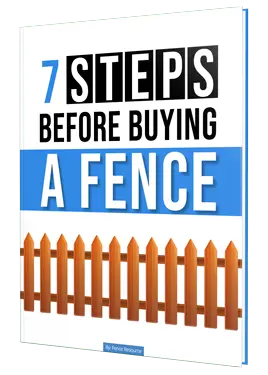The part of the fence that takes the most abuse are the gates. In order for a gate to operate flawlessly for years, they must hang from a solid foundation. This is where gate posts come into play.
The gate posts have the task of supporting the gate leaf. In order to have integrity, they must be stout and strong. Seems like common sense………doesn’t it?
Funny enough, most fence companies use posts that are barely strong enough to accommodate the weight of the gates they support. I get it. As a fence contractor, we are all trying to provide competitive pricing.
However, I have never lost a sale by explaining why stronger posts would benefit my customer. Even when it added more cost to the fence quote.
As a result, I always include stronger gate posts with every job sold. No matter the type of fence.
Upgrade the Size of Your Posts!!!
Fencing is expensive. So I understand not wanting to spend more money on a fence than needed. However, don’t skimp on certain parts of the fence.
The gate posts are one of those parts. Furthermore, depending on the type of the fence, it could only cost tens of dollars extra to do so per post. So the extra value provided is a no brainer.
In my professional opinion, at the minimum, upgrade the hinge post. Regardless of the cost. More often than not, I sell both upgraded hinge and latch posts to my customers. After explaining what the benefits are, it is an easy sell.
Here’s where the problem lies for you. If you don’t specifically ask for them, chances are your fence contractor will never offer them. Luckily, you are reading this article. Taking the time to educate yourself on why you want heavy duty gate posts.
Types of Posts for Gates
There are many types of gate posts. Most times they are the same material as the fence. But not always.
Sometimes a wood fence will have metal gate posts. Especially when installing steel framed gates. Many vinyl fences have aluminum posts reinforcements inside the hollow vinyl posts.
Sometimes large aluminum gates have steel posts in order to provide extra strength and support. Below we’ll take a look at the most common types of gate posts.
I’ll discuss the benefits of each type. I’ll also try to provide a rough idea on how much upgrading to each type will cost.
Metal Gate Posts
Gate posts for metal fences come in two main types of material. Aluminum and steel. As discussed before, your post material usually match the fence material.
Sometimes aluminum gates will hang on steel posts. However, steel gates normally never hang from aluminum posts.
With both aluminum and steel gate posts, there are two ways in which they are upgradable. The first is the wall thickness of the post. The second is the overall size of the post.
Aluminum Gate Posts
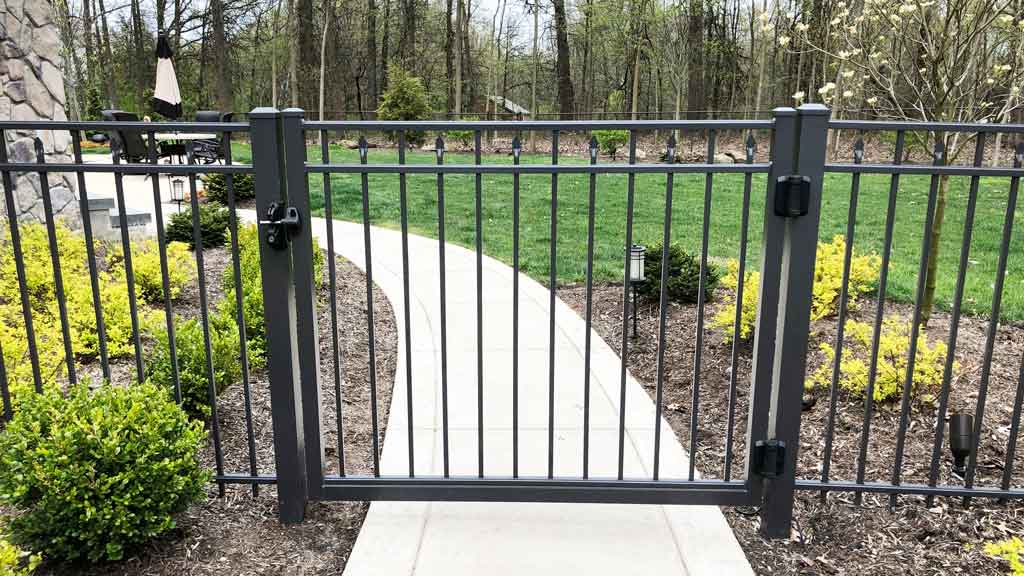
Most aluminum fences have 2″ square posts. The gate posts are also 2″ square. However, they have a heavier wall thickness than all of the other posts. You cannot tell from looking at them, but they do.
The heavier wall thickness stiffens up the post providing a more stable foundation in which to hang the gate. Furthermore, the thicker wall is better for screwing gate hinges and latches into.
But 2″ heavy walled aluminum posts aren’t enough in my option. For my customers, I sell them 3″ square heavy walled posts for their gates. Aluminum driveway gates will have even larger posts. The larger dimension posts offer even more stability for supporting gates.
So how much extra does the 3″ post add to the cost of each gate? Depending on how your fence contractor marks up their aluminum fencing, about $70 per post. Or $140 per gate.
Steel Gate Posts
Steel gate posts are just like aluminum. The posts for ornamental steel and wrought iron fences are normally 2″ square. Just like aluminum, the posts for the gates have a little thicker wall. Because steel is naturally stronger than aluminum, you may not need to upgrade the posts.
However, steel gates are also a good bit heavier than aluminum gates. So if you have a wider steel gate, upgrading the gate post will be beneficial.
Steel posts increase in strength quickly with size. They also increase quickly in price. Therefore, making the jump from a 2″ square post to a 3″ square post is probably not required.
Many ornamental steel fence manufacturers offer 2.5″ square posts. These are normally more than enough to provide extra support and strength for gates.
The cost between a 2″ square steel post and a 2.5″ square steel post varies greatly by manufacturer. Some also increase the wall thickness of the larger post. While other manufactures keep it the same as the 2″ post.
Therefore, the cost range is a wide one. Ranging between $30 – $60 more per post.
Gate Posts for Wood Gates
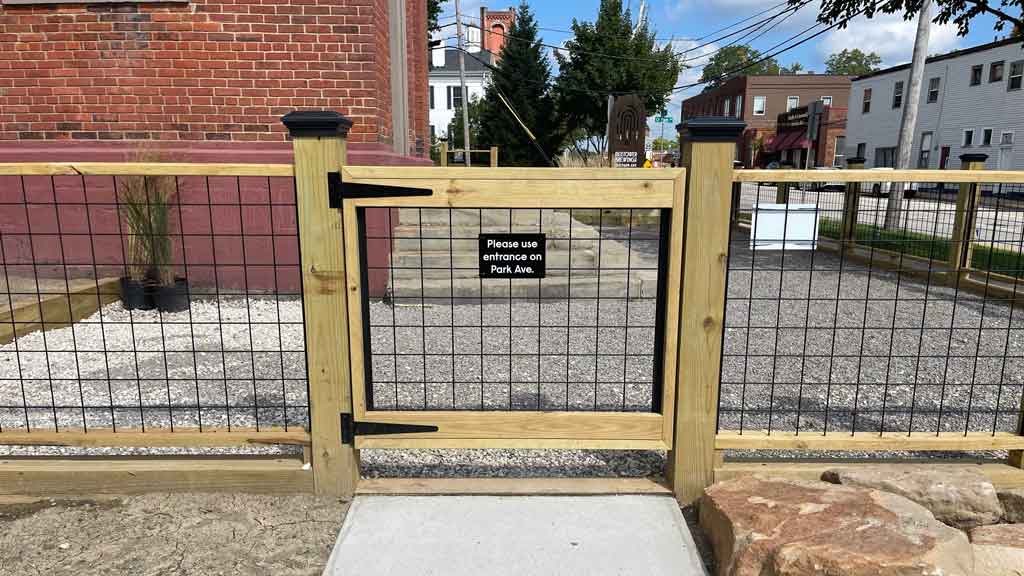
Wood fence gates normally hang from wooden gate posts. However, larger width wood gates often hang from steel posts.
For most residential projects, wood posts work the best. They blend in with the rest of the lumber used to build the fence.
Commercial wood gates often have steel frames. As a result, they also have steel gate posts. Steel posts for wood fences come in two types. Round and square.
Your contractor will most likely have a preferred choice. Square steel posts work better for attaching wood rails or fence sections to. Round steel posts have more options for hinges and hardware.
Wooden Gate Posts
The standard post size for wood fences is a 4×4. For most walk gates, a 4×4 is probably strong enough. Offering adequate support. But this article is about overkill.
Therefore, for all wood gates I sell, I use 4×6 wooden gate posts at the minimum. Even on a 3′ tall picket gate. The heavier post provides a better foundation.
Sometimes, for 6′ tall privacy fence gates or wider gates, I sell a 6×6 post. The extra strength that a 6×6 wood post provides is substantial. Especially when the gate post is standing alone. Not tied into the fence line. Such as when set next to a house for a double gate across a driveway.
As far as cost goes, upgrading wooden gate posts is minimal. the difference between a 4×4 to 4×6 post is $10 – $15 dollars. A 6×6 post may be another $10 extra.
Steel Gate Posts
Sometimes fence contractors use steel posts for wood gates. Usually these are for double gates or wider than normal single leaf gates.
Wooden gate posts that are steel are either round or square. As mentioned before, steel square posts allow for easy fastening of the horizontal rails on wood fence. However, hinge options for square steel posts are limited.
As a result, round steel posts are more common. Round steel gate posts have many options for hardware. Almost any hinge or latch available for chain link fence gates will work.
Just like ornamental steel gate posts, steel posts for wood gates are available in different wall thicknesses and diameters. Your fence contractor will know what diameter is best for the weight of the gate it supports.
The cost between wood posts and steel posts is substantial however. Depending on lumber prices, a 4x4x8 costs about $12 – $16. A heavy walled steel post could cost $90 – $120per post.
Again, worth the cost in my opinion. Knowing the post will never rot or warp is enough. Never requiring replacement. The added strength is another bonus.
Chain link Gate Posts
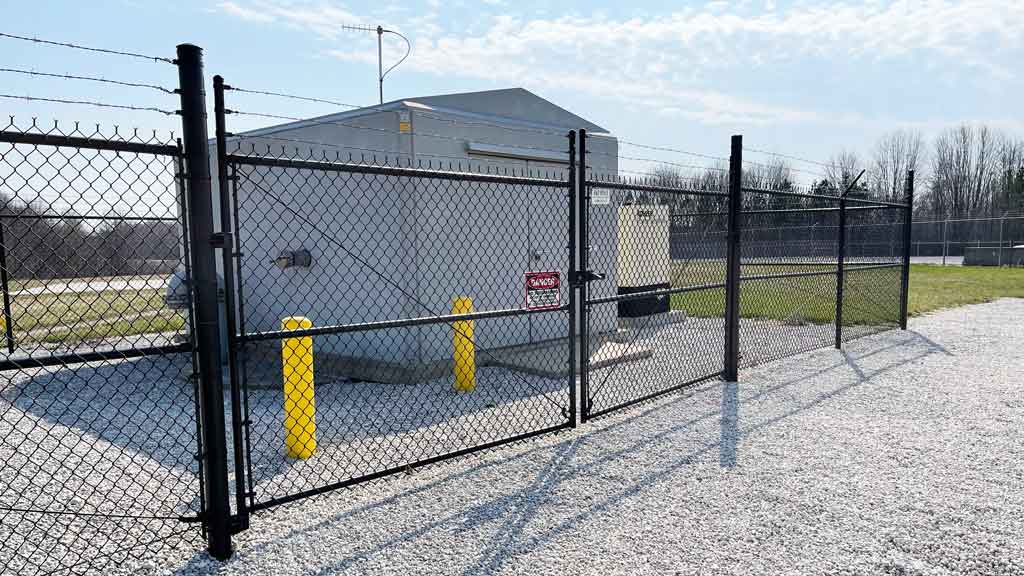
Gate posts for chain link fence gates are either larger in diameter or have a thicker wall. Sometimes they’re both. The size and diameter of the post depends on the height and width of the gate.
Chain link gates come in a variety of sizes. For residential fences, 4′ wide and 5′ wide gates are pretty standard. For commercial chain link gates, 10′ to 20′ wide gates are common.
As a result, more combinations of chain link gate posts are available compared to any other type of fence.
Diameter Size and Wall Thickness
The larger the diameter of a post, the stiffer it is. Chain link gate posts come in 2-3/8″, 2-7/8″, 4″, 6-5/8″ and 8-5/8″ in diameter. As a result, there are chain link posts to accommodate any gate size.
Chain link posts are also available in different wall thicknesses. Some of the smaller diameters come in 3 different sizes. So it is possible to have 3 posts of the same diameter have 3 different wall thicknesses.
The sizes are referred to as grades. Residential, commercial and industrial grade. However, the larger the diameter the post is, the less options there are for wall thickness.
There is a wide range in cost depending wether you are upgrading diameter or wall thickness for chain link gate posts. Because there are so many variables, it feel it is best to consult your fence contractor about pricing when upgrading.
Vinyl Posts for Gates
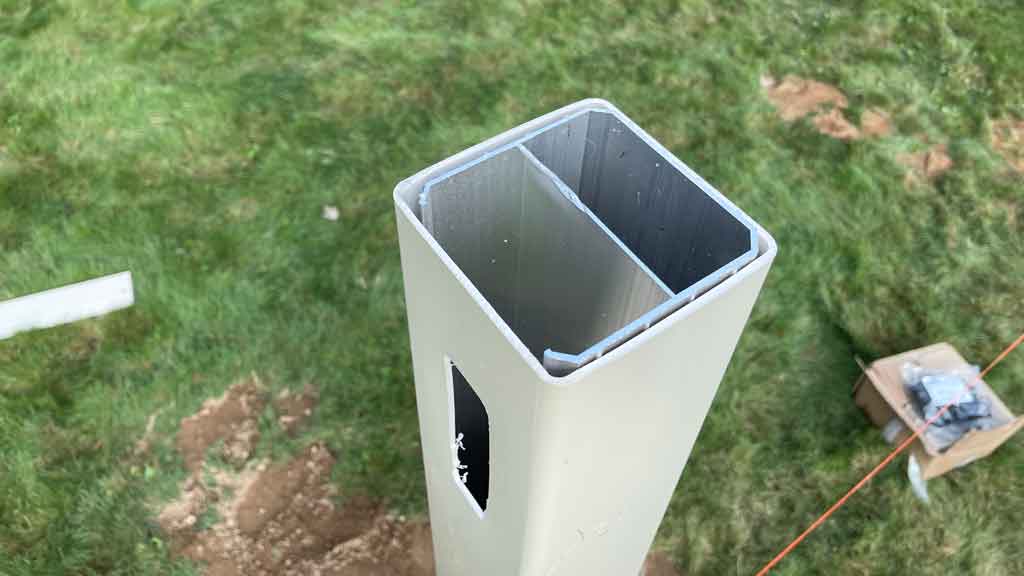
Vinyl gate posts are hollow. Therefore, they are not strong enough by themselves to support a gate. Furthermore, the screws that hold gate hardware in place need more than the wall thickness of a vinyl post to bite into in order to hold securely.
As a result, vinyl fence manufacturers offer aluminum post reinforcements. Aluminum post reinforcements fit inside of vinyl fence posts.
Most commonly used for hinge and latch posts. Sometimes, used in long lines of vinyl privacy fence to stiffen up line posts. Or any vinyl fence in a high wind area.
Aluminum reinforcements simply slide into hollow vinyl posts. However, make sure to install them before setting the posts in concrete.
The cost of an aluminum reinforcement varies by manufacturer. Some vinyl fence manufacturers offer thicker options compared to others. Most cost between $80 – $125 per post to add.

